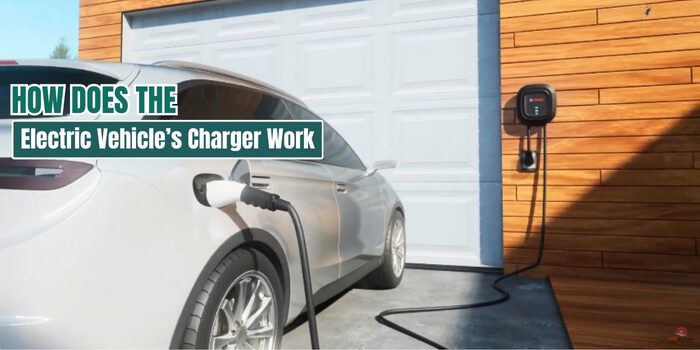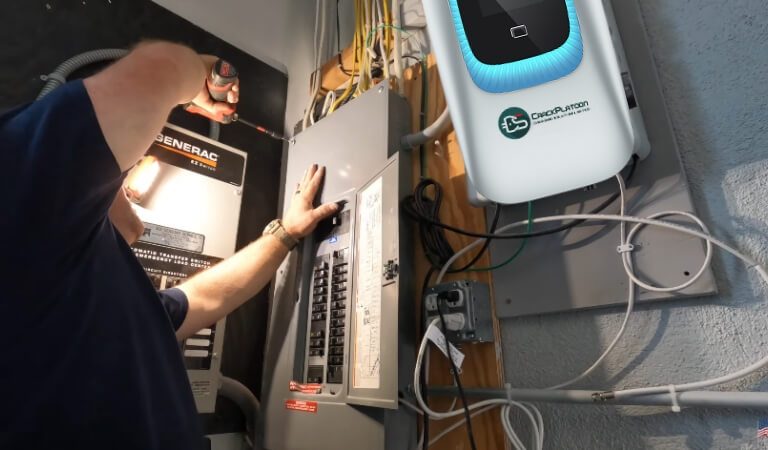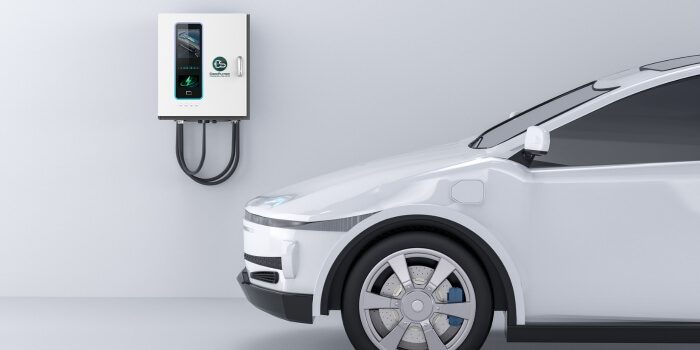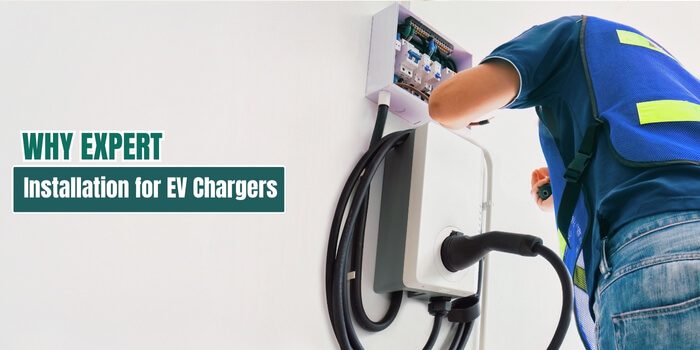Electric vehicle (EV) charger installation is not just any routine task; it’s a sophisticated process that ensures your vehicle powers up safely and efficiently at home. Now, you might be wondering, “Can any electrician install an EV charger?”
It’s not that easy to respond with yes or no. As the basic installations might be within the reach of many electricians, for larger, more complex setups, you’d need someone with a journeyman’s license or higher. This ensures that the installation meets the specific standards required for safety and functionality.
Curious to learn more? Stick around as we dive deeper into what it takes to properly install an EV charger and how to find the right professional for the job.
How Does the Electric Vehicle’s Charger Work?
Charging an electric vehicle (EV) is like filling up a traditional car with gas, but instead, you’re powering a battery. The charger converts your home’s AC (alternating current) electricity into DC (direct current) that the car’s battery can store. This process ensures your EV is ready to go when you are, making it convenient and eco-friendly.

You may wonder about the speed of charging; well, it varies based on the charger type. Level 1 chargers are standard and plug into a regular household outlet, offering slow, steady charging. Meanwhile, Level 2 chargers, which require special installation, provide a much faster charge, making them a popular choice.
Public charging stations, also known as Level 3 or DC fast chargers, offer the quickest charging speeds. These are ideal for long trips where time is of the essence, allowing drivers to charge up in minutes, not hours. However, it’s worth noting that frequent use of fast chargers can affect battery longevity.
Can Any Electrician Install an EV Charger?
The installation of an EV charger might seem straightforward, but it’s more nuanced than plugging in an appliance. Not all electricians are cut out for this task, as it requires specific skills and certifications. It’s essential to understand what makes an electrician qualified to handle your EV charger installation.

Certification and Training
A well-qualified electrician is not just any tradesperson; they’re a professional with a journeyman’s license or higher. This level of certification is not handed out lightly; it signifies a deep understanding of complex electrical systems, including those specific to EV chargers.
Training specific to EV installations is crucial because these systems differ significantly from standard residential or commercial electrical work.
The electrician’s commitment to continuing education is equally significant, ensuring they remain at the forefront of evolving technologies and changing electrical codes, which can vary significantly from one jurisdiction to another.
Experience with EV Chargers
Experience is the foremost teacher, especially when installing EV chargers. An electrician who has completed multiple installations will know the nuances of different brands and models, from basic Level 1 chargers to more complex Level 2 systems.
This familiarity is invaluable, as it means they can efficiently troubleshoot and resolve issues, ensuring a smoother installation process. Their firsthand experience also allows them to provide tailored advice on which system might best meet your needs. This is based on your vehicle, driving habits, and home’s electrical capacity.
Understanding of Electrical Systems
A comprehensive understanding of your home’s electrical infrastructure is non-negotiable. The electrician must evaluate whether your existing system can support the added demand of an EV charger without compromising safety or efficiency.
This often involves assessing not just the capacity of your current electrical panel but also the condition and layout of existing wiring. Recommendations for upgrades or modifications should be clear, well-founded, and in line with ensuring that your home’s infrastructure can safely support the added load.
Local Codes and Regulations
Getting through the maze of local building codes and regulations requires a professional who is familiar with the general requirements but who stays updated on changes. A proficient electrician will manage the entire permit process from application to final inspection, ensuring that your installation complies with all local, state, and national standards.
This not only ensures safety and legality but also avoids costly fines or required rework in the future. Compliance with local laws also assures that your installation will be recognized as valid by your homeowners’ insurance and future home buyers.
Safety Standards and Protocols
Safety is paramount in any electrical installation, especially with EV chargers, due to the high current involved. An electrician skilled in EV charger installation will prioritize this, adhering strictly to national and local safety protocols. This is to mitigate risks such as electrical fires or shocks.
This includes ensuring proper grounding, installing adequate circuit protection, and, when necessary, incorporating waterproofing measures for outdoor installations. Their adherence to these standards protects your property and your family but also extends the lifespan of your EV and its charger.
Customer Education and Support
Post-installation support is a hallmark of quality service providers. A responsible electrician will ensure you are fully briefed on how to operate and maintain your refurbished charger. This includes what regular checks you should perform and how to spot potential issues.
They should be available to answer any questions post-installation, providing peace of mind that you have ongoing support. This level of customer care ensures that you are not left in the dark once the installation is complete and underscores the value of choosing a qualified professional for the job.
While many electricians offer to install an EV charger, not all are equipped to do so correctly. It’s essential to choose someone with the right mix of certification, experience, and knowledge of local regulations and safety standards. This ensures your EV charger is installed correctly, efficiently, and safely.
Factors to Consider While Installing the EV charger at Home
A decision regarding the right spot for your home EV charger isn’t as simple as picking where your garden gnome stands. It involves careful consideration, balancing convenience with technical requirements. Let’s guide you through the key factors that will guide you to make an informed decision.

Electrical Capacity
Your home’s electrical capacity is the bedrock of the installation process. Ensure your system can handle the additional load without overloading. An electrician can assess your current setup and recommend upgrades if necessary. This step is crucial to avoid tripping breakers or potentially, electrical fires.
Charger Location
Select a location that is practical for your vehicle’s parking spot and daily routine. The charger should be easily accessible to avoid stretching cables or obstructing pathways. Consider weather exposure and waterproofing needs. Remember, convenience should not compromise safety or accessibility.
Type of Charger
Decide between Level 1 and Level 2 chargers based on your vehicle’s needs and daily usage. Level 2 chargers are faster but may require significant electrical upgrades. Evaluate the cost versus charging speed to find a balance that suits your lifestyle. Remember, future-proofing saves money in the long run.
Permits and Regulations
Research local regulations and obtain the necessary permits before starting the installation. Compliance with local codes ensures a legal installation and ensures the validity of your insurance policy. An experienced electrician can guide these waters, ensuring your installation meets all legal requirements. This step is non-negotiable for hassle-free experiences.
Why Do Need an Expert to Install an EV charger?
Establishing an EV charger at home isn’t a DIY project; it’s a task that requires precision, expertise, and understanding. Considering the complexity and safety risks involved, having a professional handle the installation is crucial. Here’s why enlisting an expert, like those from Crackplatoon, is essential for your EV charger setup:

- Safety Concerns: An expert ensures all installations meet safety standards, reducing risks of electrical hazards. Professionals from Crackplatoon are trained to handle high-voltage equipment safely.
- Compliance with Codes: Specialists are up-to-date with local building codes and regulations. Crackplatoon experts ensure your installation complies with all legal requirements.
- Correct Installation: Proper installation affects charger efficiency and lifespan. Crackplatoon’s professionals ensure your charger is installed correctly for optimal performance.
- Warranty Preservation: DIY installation may void the warranty of your EV charger. Using Crackplatoon’s expert service helps maintain your charger’s warranty.
- Technical Knowledge: Professionals understand the technical requirements of different EV models. Crackplatoon technicians tailor the installation to fit your specific EV and home setup.
- Future Support: Post-installation support resolves any future issues quickly. Crackplatoon provides ongoing support and maintenance for installed EV chargers.
Installing an EV charger involves more than just plugging in a device. It requires a detailed understanding of electrical systems, safety standards, and specific equipment. By choosing a professional service like Crackplatoon, you ensure that your EV charger is installed safely, efficiently, and correctly, giving you peace of mind and the best return on your investment.
Frequently Asked Questions about Can Any Electrician Install an EV Charger?
Achieving success in the world of electric vehicle (EV) chargers can be complex, especially when it comes to installation. Here are some frequently asked questions about whether any electrician can install an EV charger, designed to clear up any confusion.
What Qualifications Should an Electrician Have to Install an EV Charger?
An electrician should be licensed, ideally with experience in EV charger installations. They should understand electrical systems well and be familiar with local building codes and regulations, ensuring the installation is safe and compliant.
Is Special Training Required for Electricians to Install EV Chargers?
Yes, special training is typically required. This ensures the electrician understands the specific requirements of EV charging stations, including electrical demands and safety standards. Training can come from certification programs or direct manufacturer instruction.
Can I Hire a Local Electrician to Install My Home EV charger?
While you can hire a local electrician, ensure they have experience and training in installing EV chargers. It’s crucial for safety and efficiency that they understand the specific requirements and standards of EV charging systems.
What Risks Are Associated with An Improperly Installed EV Charger?
Improper installation can lead to electrical hazards, such as fires or shocks. Additionally, it might result in inefficient charging or damage to your vehicle’s battery, potentially voiding warranties and leading to costly repairs or replacements.
Closing Remarks
Beginning the journey of installing a home EV charger brings about a mix of excitement and responsibility. As we’ve explored, this task transcends the mere act of installation; it encompasses safety, efficiency, and legal compliance.
So, when thinking, can any electrician install an EV charger, you should remember our discussion above. A qualified professional, like those from CrackPlatoon, equipped with the right training, experience, and understanding of local codes, is crucial.
By ensuring your installer meets these criteria, you’re not just facilitating a successful setup but also investing in the longevity and safety of your home and EV.
